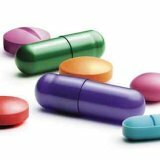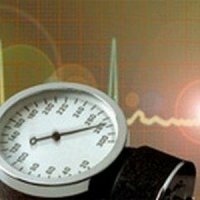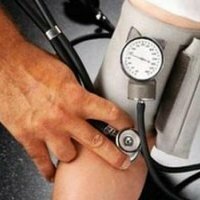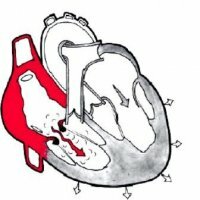Drugs for the treatment of angina pectoris
 Medical diagnosis of "angina", or as the English physician named Herbaden V. Herbaden "pectoral toad" is nothing more than a feeling of pain or discomfort in the sternum during walking or any physical activity. This disease is associated with a narrowing of the arteries, supplying the heart with blood, and its cause in 90% of cases is coronary artery atherosclerosis. To a group of people at risk of angina, people with diabetes, hereditary cardiovascular diseases that abuse smoking, and people of advanced age can be included. Today we will talk about medications for the treatment of angina pectoris.
Medical diagnosis of "angina", or as the English physician named Herbaden V. Herbaden "pectoral toad" is nothing more than a feeling of pain or discomfort in the sternum during walking or any physical activity. This disease is associated with a narrowing of the arteries, supplying the heart with blood, and its cause in 90% of cases is coronary artery atherosclerosis. To a group of people at risk of angina, people with diabetes, hereditary cardiovascular diseases that abuse smoking, and people of advanced age can be included. Today we will talk about medications for the treatment of angina pectoris.
Physicians who suffer from angina are divided into four main classes. The first class includes people who have attacks of pain, only with heavy loads usually pass after rest. The second class consists of patients who experience pain at moderate loads, for example, when they climb to the 3rd floor. The third class includes those patients who experience seizures with very low physical exertion, and the attacks quickly pass after taking nitroglycerin. The last, the fourth class, are those who feel pain constantly and any insignificant load worsens their condition.
At the first sign of angina, immediately consult a doctor. After the examination and the analysis, you will be given appropriate treatment. However, it is useful for any patient to know what preparations and why it is necessary to take in the treatment of angina pectoris.
There are two approaches to the treatment of angina pectoris. First, it is an improvement in the patient's well-being and a decrease in the intensity and frequency of seizures. Secondly, it is the prevention of various complications. All drugs used in these cases are divided into 3 large groups: calcium antagonists, nitrates and beta-blockers. By their principle of action, they are similar - they improve the delivery of oxygen to the heart muscle. Supply of the heart with oxygen occurs, it is possible to say, in a roundabout way. Pumping a huge amount of blood, it, oddly enough, gets oxygen only thanks to coronary vessels. During the contraction of the heart, all the vessels contract, and oxygen does not flow, it becomes possible only at the moment of relaxation of the heart muscles. If the coronary vessels( as in the case of angina pectoris) are closed by atherosclerotic plaques, then the heart pants without oxygen. That is why in the treatment of angina, the main therapeutic effect of taking medications is the provision of oxygen to the heart.
medications - calcium antagonists, which include, for example, "nifedipine" and "verapamil" are successfully cope with this. These medications are usually prescribed for the treatment of elderly patients. Their use is preferable primarily because these drugs can be taken with diabetes, bronchospasm or hypertension. Unfortunately, these diseases are increasingly becoming the companions of patients in old age.
In case of acute attack of pain in angina , the first of the drugs is nitroglycerin. Its effect begins very quickly, but if no improvement occurs within 30 minutes, there is a risk of myocardial infarction. There are preparations of stenocardia of this group, which have a longer period of action. They expand the vessels and maintain this state of the body from several hours to several days. Thus the attack of a stenocardia does not happen. These drugs include such as "nitrosorbide", "sostak", "monochinkwe", "monosan", "efoks."Unfortunately, long-term use of nitrates is addictive and has many side effects - headache and dizziness, lowering blood pressure, tachycardia.
Betta-blockers , in addition to its main action, normalize the frequency of heart contractions and normalize blood pressure. The dose of these medicines must necessarily be selected individually. Betta-blockers include such drugs as propranolol, atenolol, or metapronol. The intake of these drugs is contraindicated in those who have had attacks of bronchial asthma. During treatment, betta-blockers should constantly measure the heart rate, since there is a possibility of its reduction. In this case, you should see a doctor, you may need to reduce the dose of the medicine taken or completely cancel it.
Treatment always begins with the use of a single drug and in a minimal dose. In the event that no improvement is observed, they switch to therapy with several drugs and increase their dose. After improvement, they return to taking one drug, and the dose again gradually decreases.
When prescribing medicines, doctors always include antiplatelet drugs( or antiplatelet agents) in the list of any .Taking these drugs leads to an improvement in blood properties, and prevents the formation of blood clots. It can be a regular aspirin, but in its pure form it has an adverse effect on the stomach. Therefore, more modern drugs, such as "cardiomagnet" or "Trombo Ass" are often prescribed.
Since the primary cause of angina is atherosclerosis, statin drugs are prescribed( lipid-lowering drugs).Their reception can significantly reduce the amount of cholesterol in the blood. They are absolutely safe. However, treatment with these drugs should be carried out constantly, as a sharp cancellation can lead to a risk of myocardial infarction. Such medicines include, for example, "vasilip" and "lypimar".
In general, when treating angina patients need to change the usual order of life. It is necessary to reduce any physical exertion, to quit smoking, to follow a diet that is aimed at reducing weight and reducing cholesterol in the blood.
You should pay attention to your health and remember that self-medication is unacceptable! In each case, the doctor will prescribe an individual treatment taking into account all the characteristics of the patient.



